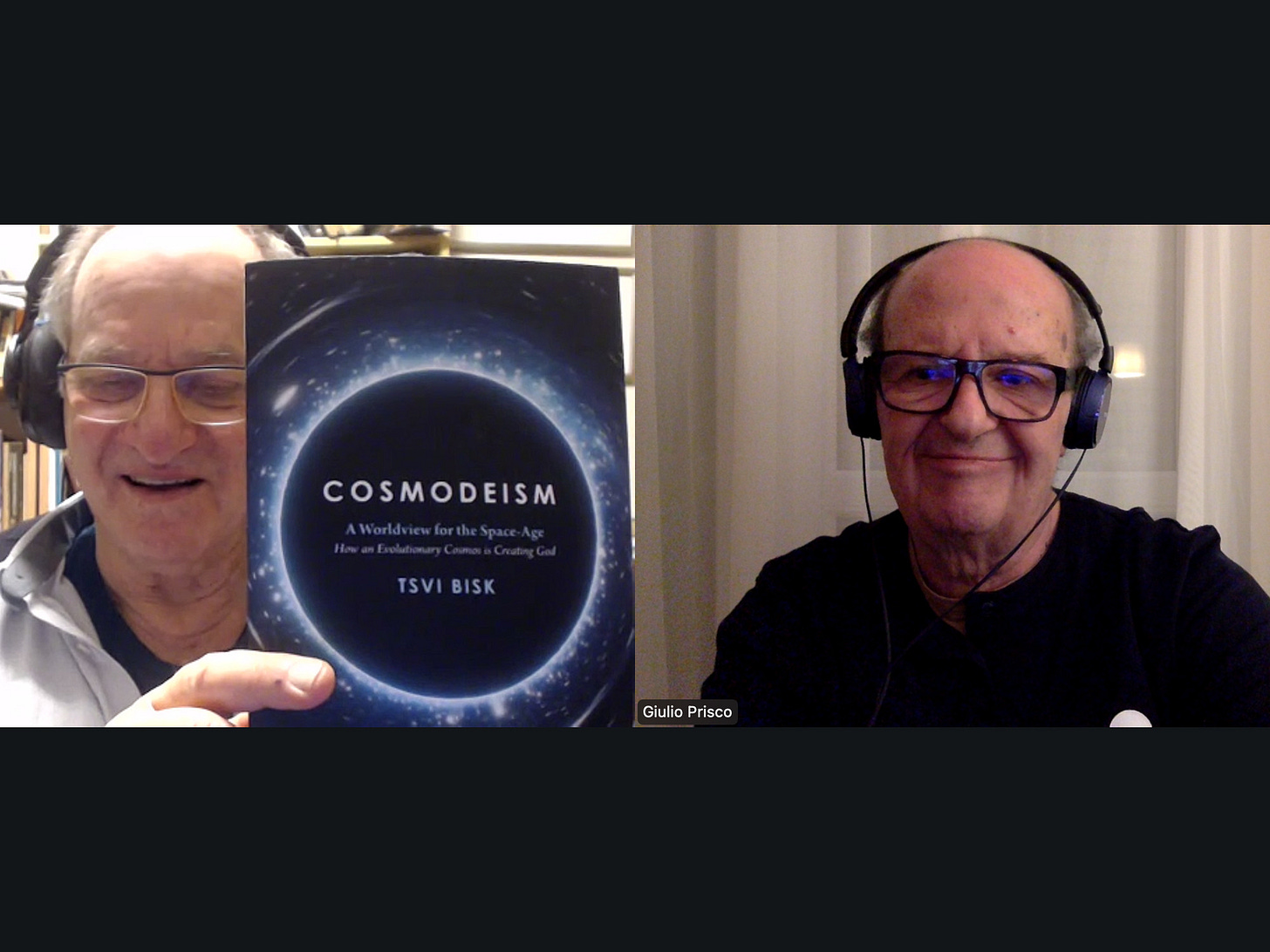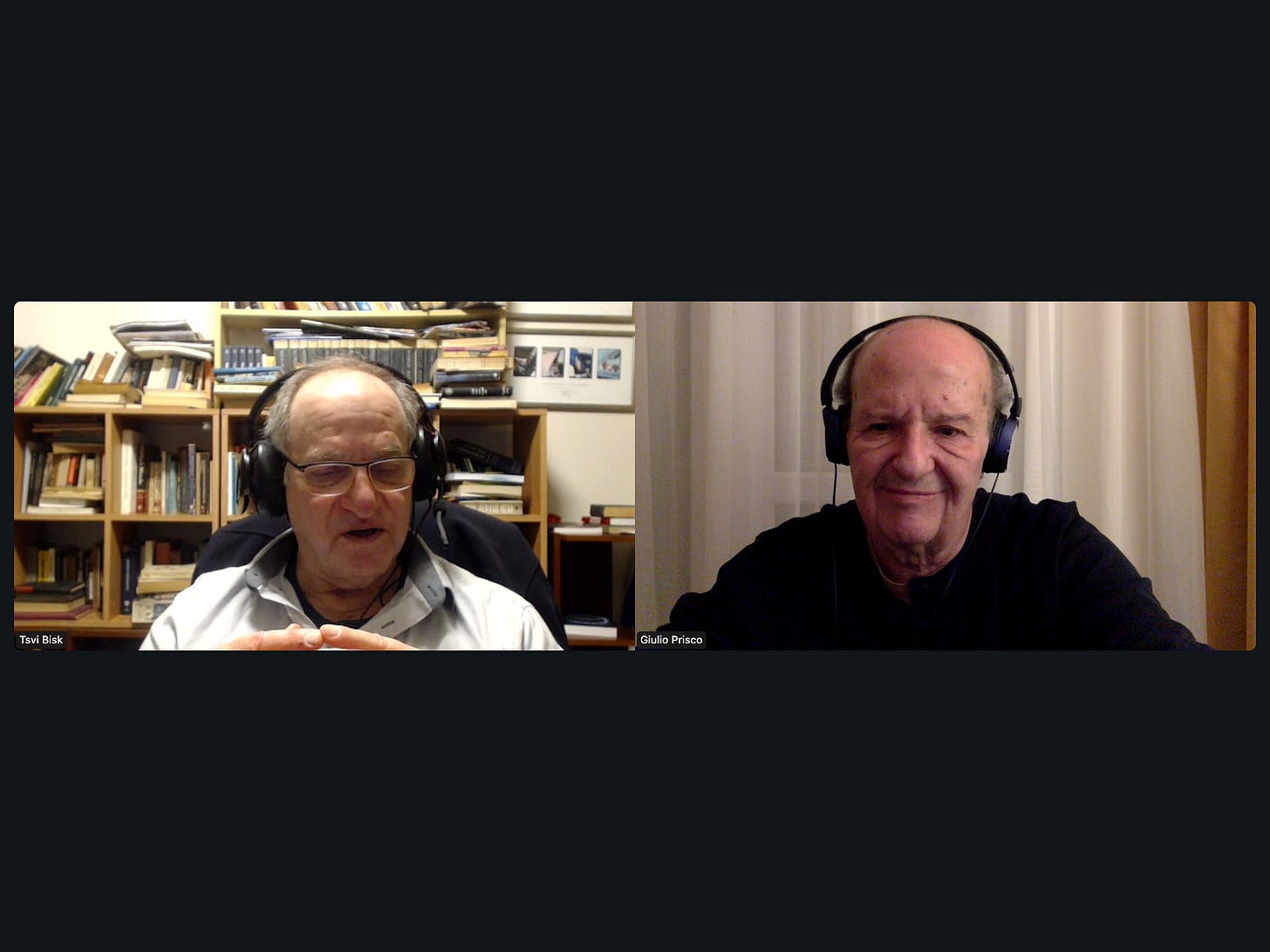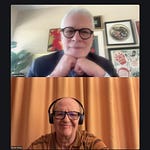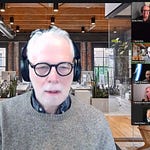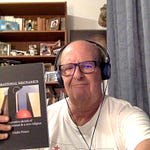This is a video recording of a conversation with Tsvi Bisk, the author “Cosmodeism: A Worldview for the Space-Age: How an Evolutionary Cosmos is Creating God” [Bisk 2024]. We discussed the parts of the book that I found more interesting (scroll down for my review) and Bisk added other insightful considerations and pearls of rabbinic wisdom.
This video is also on YouTube.
I’ve been reading the book “Cosmodeism: A Worldview for the Space-Age: How an Evolutionary Cosmos is Creating God” [Bisk 2024], by Tsvi Bisk. I highly recommend the book.
Bisk’s overall thesis is clearly summarized in the title of his book: the evolution of the cosmos is creating God. “Not ‘In the beginning God created the Heavens and the Earth’, but rather ‘In the end an Evolutionary Cosmos will have created God’ is the singular message of this book.”
Bisk echoes Arthur Clarke: “It may be that our role on this planet is not to worship God but to create him.” He praises many of my favorite thinkers like Clarke himself, Olaf Stapledon, and Thomas Nagel, and he uses many of my favorite quotes from them (like this one from Clarke).
Bisk’s worldview is strongly influenced by his mentor Mordechai Nessyahu. Many of Nessyahu’s writings haven’t been translated, but Bisk provides summaries and insightful observations. Nessyahu used the term Cosmotheism for his philosophy. But Bisk prefers to use the term Cosmodeism because “theism conjures up an image of a supernatural god (outside of nature and natural laws) while deism places the concept within the limitations of natural theology.”
Following Nessyahu, Bisk makes a difference between what he calls the cosmos and what he calls the universe. The universe is the infinite reality that contains an infinite number of cosmoses. A cosmos starts with some kind of singularity in the overall universe of infinite reality, which spawns a local Big Bang. Bisk doesn’t speculate much on the mechanics of a Big Bang, but notes the parallels with inflationary cosmology [Chapter 9 of Prisco 2024].
Referring to the tension between today’s Big Bang cosmology and the steady state cosmology proposed by Fred Hoyle [Chapter 14 of Prisco 2020], Bisk suggests that “infinite Nature is steady state (producing singularities ad infinitum) while our Cosmos is a product of one of these singularities which resulted in our Big Bang.” This makes a lot of sense to me. Besides inflationary and steady states cosmologies, Bisk notes parallels with the plasma cosmology proposed by Hannes Alfvén and popularized by Eric Lerner [Lerner 2010]. Bisk doesn’t speculate on possible interactions between our cosmos and the universe at large, but notes that “there may be such interaction as yet to be discovered.”
The evolution of a Cosmos is likely to create a God. Bisk emphasizes that the “Godding” of the Cosmos is a natural process (as opposed to something supernatural) that could involve not only known physics but perhaps “a new cosmological/biological law” that “will provide the scientific framework for the creation of ‘God’ as a universal spiritual entity which will, in effect, be the sum total of conscious beings throughout the Cosmos.”
Despite these and other hints at a future science beyond today’s horizon, I have the impression that Bisk is still too entrenched in today’s mainstream consensus science. For example, he says that there could be aliens much more advanced than us, but they would still be unable to “communicate faster than the speed of light.” This is the current consensus indeed, but quantum mechanics (which is also mainstream consensus science) suggests that reality is nonlocal behind the scene of space and time, so I think Bisk should be more open minded on this point.
What about us? Bisk argues that actively participating in the Godding of the Cosmos is “our sacred duty to the Cosmos.” Cosmodeism can inspire us “to strive to become part of the Divine Drama (the Godding of the Cosmos).” I totally agree, and I’ve elaborated on this point in [Chapter 15 of Prisco 2024].
What about artificial intelligence (AI) and robots [Chapter 12 of Prisco 2024]? Bisk doesn’t talk about AI robots much. He says that they will be our workers in outer space, or “the cosmic proletariat.” But I think conscious superintelligent AI robots could replace us and carry on our sacred duty to the Cosmos in our stead. It seems to me that, if this is what is going to happen, building them is our contribution to the divine drama.
If nature is infinite in space and time, “it is impossible that a god has not already been created in some other very ancient Cosmos.” Perhaps these gods strive toward the Godding of all of reality and help younger cosmoses create more gods.
Bisk doesn’t intend to create a new religion, but his “wish is that Cosmodeism be assimilated by the legacy religions.”
He cites and praises the book “Human Purpose and Transhuman Potential: A Cosmic Vision for Our Future Evolution” [Chu 2014], by Ted Chu. I reviewed Chu’s book in [Chapters 7-8 of Prisco 2020]. I argued that Chu’s cosmic view can play many of the impersonal, philosophically oriented roles of religion, but it doesn’t offer hope in an afterlife. Therefore, it isn’t emotionally comforting enough. This is also my main criticism of Bisk’s excellent book.
However, Bisk admits that Cosmodeism "might actually give credence” to some of the intuitions of an afterlife found in the legacy religions. Consciousness might be some kind of energy or coherence that cannot be destroyed, and “survives in a different form” in the Cosmos. Bisk warns that even in this case we “would not retain our individual identities after death.” But here again, I think he should be more open minded and imaginative. In [Chapter 14 of Prisco 2024] I have sketched some scientifically plausible (I think) paths to a personal afterlife.
Bisk, a Jew, is a student of religions and has included in the book several chapters dedicated to the parallels between Cosmodeism and traditional religions like Judaism, Christianity, Islam, and Eastern religions. He is persuaded that these religions “have already intuited the Cosmodeistic Hypothesis… or can accommodate the Cosmodeistic Hypothesis.”
This could facilitate the assimilation of Cosmodeism that Bisk is hoping for. But as I noted, I think Cosmodeism is missing the most important factor - the hope in a personal afterlife - that makes traditional religions emotionally comforting and appealing. I don’t think Cosmodeism can make much of a difference without offering this hope.
If God will exist in the future, how can God have any influence on the world here and now? This is not a problem for the traditional religions analyzed by Bisk, whose Gods have always existed, but Cosmodeism should answer the question. I think a God that is powerful enough would be able to control the totality of space and time and influence events in the past [Chapter 13 of Prisco 2024]. Bisk doesn’t answer (or ask) this question, but he quotes a passage by Olaf Stapledon that I also quote: “God, who created all things in the beginning, is himself created by all things in the end.”
Bisk’s book can also be read as a practical philosophy book that can help navigate life. Among my favorite gems of rabbinic wisdom for our times are Bisk’s praise of laughter, which “purifies the soul” better than meditation or prayer, and his scorn at “a certain intellectual ‘elite’ whose devotion to analytic thought has explained away everything that people know in their gut and in their heart makes them human.” Following Sartre, he believes that we must invent our meaning, not for self-deception but “as an ontological categorical necessity to give the Cosmos itself meaning.”
[Bisk 2024] Tsvi Bisk. Cosmodeism: A Worldview for the Space-Age: How an Evolutionary Cosmos is Creating God. Westphalia Press, 2024.
[Chu 2014] Ted Chu. Human Purpose and Transhuman Potential: A Cosmic Vision for Our Future Evolution. Origin Press, 2014.
[Lerner 2010] Eric Lerner. The Big Bang Never Happened: A Startling Refutation of the Dominant Theory of the Origin of the Universe. Vintage, 2010.
[Prisco 2020] Giulio Prisco. Tales of the Turing Church: Hacking religion, enlightening science, awakening technology. Giulio Prisco, 2020.
[Prisco 2024] Giulio Prisco. Irrational mechanics: Narrative sketch of a futurist science & a new religion. Giulio Prisco, 2024.


